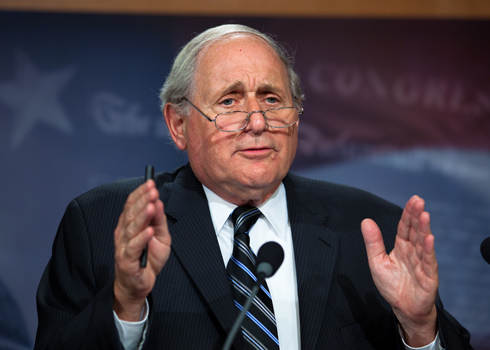Given that President Obama’s not going to bring the war in Afghanistan to an early end as the result of Osama bin Laden’s death, a key question is whether his administration will green light a robust troop drawdown starting in July, or whether the withdrawal will happen more slowly, as some in his administration would like.
That’s the pivot, and there will be increasing pressure on Obama from Democrats to use bin Laden’s death in Pakistan to make the case for a swifter reduction.
TPM SLIDESHOW: Osama Bin Laden: 9/11 Mastermind, Longtime U.S. Enemy Killed In Pakistan
“I think there’s going to be a lot of strong feeling on the part of most Democrats and many, I think many independents, and even some Republicans that the decision of the President to reduce the number of troops in Afghanistan should be a robust reduction,” Senate Armed Services Committee Chairman Carl Levin (D-MI) told reporters on a conference call with reporters Monday afternoon. “I don’t think that’s going to change, and I don’t expect the decision of the President — his instinct to have a reduction, and I believe a robust reduction following conversations with him — that that instinct would be reinforced.”
Making that argument operationally is a bit tougher. Levin argues that bin Laden’s death punctures the mystique of his movement — that after a brief uptick in attacks on U.S. forces in Afghanistan, al Qaeda will have a harder time convincing supporters to die for the cause. And that will make it easier for the Afghan government to more fully take responsibility for their own country.
In Levin’s own words, “Afghans now are in an even better position to take responsibility, because whatever direction is coming from Pakistan, from that safe haven, no longer has the guidance, whatever strength bin Laden’s presence or direction could give to it.”
That’s now weakened. So the potential of the Afghan army and police to take responsibility is greater now and the fear that, gee whiz can they do it on their own, is something which now is of lesser concern, because the direction, the strength, the leadership of bin Laden and al Qaeda from that safe haven in Pakistan is severely weakened, and that should strengthen the hand of the Afghan security forces….
I don’t think there was day-to-day control at all. What there was was this idea that somehow or other that the messages that come from across the border to die for the cause have that mystique behind those messages, when they’re given to those young people who are committing suicide. That’s gone. Now, there’ll be a substitute mystique which will be attempted and I don’t want to be naive at all about the fact that there may be — probably will be — an increase in suicide bombers as a kind of retaliation…but in terms of there being any more there in some sense guiding — a guiding hand — is now gone. It won’t be long before that settles in.
Al Qaeda recruits in Afghanistan will soon be asking, “Who is this now sending these messages to us to die for this extreme cause?” The question is whether that argument will convince policy makers in the Obama administration that bin Laden’s death agitates for a swifter drawdown in something other than a symbolic way.










